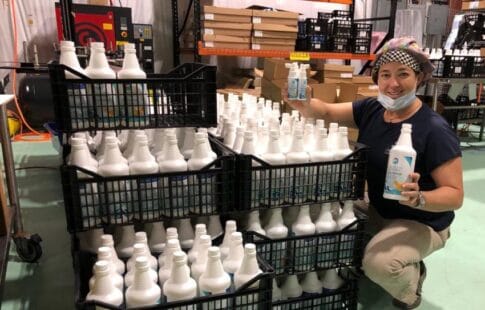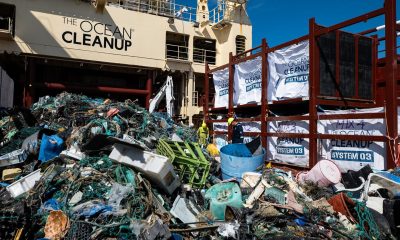Marine Life & Conservation
Stream2Sea Founder Autumn Blum creates eco-conscious hand sanitizer and saves her company amidst COVID-19

Is your sanitizer reef safe?
As hand sanitizers become a part of our daily lives, Stream2Sea CEO and avid diver Autumn Blum says it’s time to take a hard look at the products on the market.
“When it all started, we were just happy to find sanitizers on store shelves so many of us didn’t take the time to read the ingredients,” she says. “If you look carefully though, some of those ingredients are pretty scary – for our coral reefs and for our own bodies.”
At the height of the pandemic, the government lifted restrictions and eased barriers for manufacturers to help reduce the shortage, but that inadvertently encouraged a flood of sub-standard products.
Even beyond the recall of sanitizers containing methanol, many commercial hand sanitizers are using ingredients that aren’t safe for people or the environment.
Microplastics in Sanitizers
Although microplastic beads have been banned from toothpastes and body lotions, many cosmetics still contain hidden microplastics. And hand sanitizer is no exception to that. More than 97% of the sanitizer gels on the market today contain ingredients commonly considered to be microplastics. These include acrylates copolymer and carbomer.
True to Stream2Sea’s planet-friendly mission, both sanitizer formulas are 100% natural, plant based and microplastic free.
All Alcohol Isn’t Created Equally
“Sanitizers are usually made with commercially denatured alcohol, which is just ethanol mixed with a substance that makes it unsuitable for human consumption and less likely to be consumed recreationally,” Blum said. “The most common alcohol being used for sanitizer is called SDA 40-B ethanol. It contains denatonium benzoate and tert-butanol, denaturants that are often not listed on product labels. After reading the SDS (safety data sheets) on these ingredients, I would never use them in our formulas, or intentionally put them on my body or near our waters.”
Among other warnings, the data sheets clearly state:
- May cause central nervous system depression.
- May be absorbed through the skin.
- Causes serious eye damage.
- Fatal if inhaled.
- Material may be irritating to the mucous membranes and upper respiratory tract.
Reading Labels Doesn’t Always Count
The FDA specifically includes the use of tert-butanol as a denaturant without requiring that it is listed on the label in a temporary policy implemented while hand sanitizers were in short stock. This goes against the standard policy for hand sanitizers, which are regulated as OTC drugs and typically require all ingredients be listed.
With its headquarters in Florida, Stream2Sea was able to secure locally produced ethanol made from distilled orange peels or sugarcane waste. Rather than chemical denaturants, Stream2Sea sanitizers are made ‘unedible’ using natural camphor and eucalyptus essential oils, both of which are traditionally used in herbal medicine. Rather than using propylene glycol – an ingredient found in both antifreeze and commercial sanitizers – as a moisturizer, Stream2Sea uses vegetarian glycerin and Vitamin E. The formula is extraordinarily effective as well. Challenge tests require sanitizers kill 99.99% of germs within 60 seconds; this was shown to be clinically effective in less than 15 seconds.
Keeping It Real: The Challenge of Selling Sanitizer During a Pandemic
A Crash Course for Blum
Learning the ins and outs of manufacturing sanitizer was a crash course for Blum, an award-winning cosmetic chemist who started Stream2Sea to make reef-safe sunscreens and body care products. “One day we were gearing up for a busy beach and cruise season, the next day we were pretty much shut down,” she said.
With a dozen employees and an idle FDA-registered manufacturing facility, making hand sanitizer was the answer to keeping her company going as the pandemic shut down many businesses.
“We’re all making compromises through this crisis but, as divers and as a nation, we need to be aware of the ingredients we are purchasing, so we know exactly what we’re putting on our bodies and spreading across our planet.
As our world and our dive centers gets back to business, “We look forward to continuing to educate divers about reef safe sunscreen and body care ingredients, and will now include sanitizers and microplastics in trainings.”
Source: www.divenewswire.com
Blogs
The Ocean Cleanup Breaks 10,000,000 KG Barrier

The Ocean Cleanup, the global non-profit project, has removed a verified all-time total of ten million kilograms (22 million lbs.) of trash from oceans and rivers around the world – approximately the same weight as the Eiffel Tower.
To complete its mission of ridding the oceans of plastic, The Ocean Cleanup uses a dual strategy: cleaning up the Great Pacific Garbage Patch (GPGP) to remove the plastic already afloat in the oceans, while stopping the flow of plastic from the world’s most polluting rivers.
Through cleaning operations in the GPGP and in rivers in eight countries, the cumulative total of trash removed has now surpassed ten million kilograms. This milestone demonstrates the acceleration of The Ocean Cleanup’s impact, while underlining the astonishing scale of the plastic pollution problem and the need for continued support and action.
While encouraging for the mission, this milestone is only a staging point: millions more tons of plastic still pollute our oceans and The Ocean Cleanup intends to continue learning, improving and innovating to solve this global catastrophe.
This announcement comes as governments from around the world meet to continue negotiations to develop a new legally binding instrument to end plastic pollution at INC4 in Ottawa, Canada. Representatives of The Ocean Cleanup will be in attendance and the organization will be urging decision-makers to collaborate towards a comprehensive and ambitious global treaty which addresses plastic at all stages of its life cycle and in all marine environments worldwide, including in areas beyond national jurisdiction.
It is encouraging to see that the need for remediation is reflected in the various options for potential treaty provisions. It is essential that the final treaty contains clear targets for the remediation of legacy plastic pollution, and reduction of riverine plastic emissions.
Tackling plastic pollution requires innovative and impactful solutions. The treaty should therefore incentivize the innovation ecosystem by fostering innovations that make maximal use of data, technology and scientific knowledge – such as those designed and deployed by The Ocean Cleanup.
‘After many tough years of trial and error, it’s amazing to see our work is starting to pay off – and I am proud of the team who has brought us to this point.’ said Boyan Slat, Founder and CEO of The Ocean Cleanup. ‘While we still have a long way to go, our recent successes fill us with renewed confidence that the oceans can be cleaned.’
The Ocean Cleanup was founded in 2013 and captured its first plastic in 2019, with the first confirmed catch in the GPGP coming soon after the deployment of Interceptor 001 in Jakarta, Indonesia. After surpassing one million kilograms of trash removed in early 2022, the non-profit project has since progressed to the third iteration of its GPGP cleaning solution, known as System 03, and a network of Interceptors currently covering rivers in eight countries, with more deployments set for 2024.
About The Ocean Cleanup
The Ocean Cleanup is an international non-profit organization that develops and scales technologies to rid the world’s oceans of plastic. They aim to achieve this goal through a dual strategy: stemming the inflow via rivers and cleaning up the legacy plastic that has already accumulated in the ocean. For the latter, The Ocean Cleanup develops large-scale systems to efficiently concentrate the plastic for periodic removal. This plastic is tracked and traced through DNV’s chain of custody model to certify claims of origin when recycling it into new products. To curb the tide via rivers, The Ocean Cleanup has developed Interceptor™ solutions to halt and extract riverine plastic before it reaches the ocean. Founded in 2013 by Boyan Slat, The Ocean Cleanup now employs a broadly multi-disciplined team of approximately 140. The foundation is headquartered in Rotterdam, the Netherlands.
For more information, visit: theoceancleanup.com and follow @theoceancleanup on social media.
Marine Life & Conservation
Steve Backshall to headline Shark Trust’s flagship event: For the Love of Sharks

Join a host of amazing, shark loving, speakers including Steve Backshall and the Shark Trust team for an evening celebrating shark conservation at the Royal Geographical Society in London this November.
Date: 29th November 2024
Time: 6-10pm
Location: Royal Geographical Society, London
Tickets: https://www.sharktrust.org/Event/flos24
The event will be a celebration of all things shark. Those lucky enough to get hold of tickets will hear from engaging guest speakers with a passion for sharks.
The line-up includes (*subject to change if unforeseen circumstances arise)
Steve Backshall: One of television’s busiest presenters, BAFTA award-winning wildlife expert Steve has been passionate about the wild world ever since he was young.
Steve’s impressive TV career has taken him all around the world, investigating a wide array of species and environments. Steve has filmed over 100 hours of children’s wildlife programmes with the BAFTA award winning Deadly 60 franchise and recently, with Sky Nature, for his new series ‘Whale with Steve Backshall’. He has been a patron for the Shark Trust for 10 years.
Simon Rogerson: is a photojournalist specialising in natural history, diving and the sea.
He is editor of SCUBA magazine, the official journal of the British Sub-Aqua Club. Simon started his career as a crime reporter but gravitated towards his ‘less depressing’ interest in underwater exploration, joining the staff of DIVE magazine in 1999. In 2005 he was named ‘Editor of the Year’ in the PPA’s Independent Publishing Awards. Simon also works as a freelance writer, contributing frequently to the Sunday Times and Telegraph, in addition to BBC Wildlife, Esquire, and a host of international diving magazines. He is the author of a book, Dive Red Sea, published by Ultimate Sports. Now based in Berkshire, Simon has been a Patron of the Shark Trust for 20 years.
More speakers to be announced soon. Head to the Shark Trust website to learn more.
The evening will also allow guests the final chance to see the Oceanic 31, shark art exhibition. Some of the artwork will be auctioned/raffled at the event, while the rest will be auctioned online to raise money for the Shark Trust Oceanic Programme.
For the Love of Sharks is an evening with something for everyone who is interested and fascinated by sharks. Join the Shark Trust, their Patrons, Trustees and Staff, along with a host of supporters for this celebration of shark conservation.
For more information or to buy a ticket: https://www.sharktrust.org/Event/flos24
-

 News3 months ago
News3 months agoCapturing Critters in Lembeh Underwater Photography Workshop 2024: Event Roundup
-

 Marine Life & Conservation Blogs3 months ago
Marine Life & Conservation Blogs3 months agoCreature Feature: Swell Sharks
-

 Blogs2 months ago
Blogs2 months agoMurex Resorts: Passport to Paradise!
-

 Blogs2 months ago
Blogs2 months agoDiver Discovering Whale Skeletons Beneath Ice Judged World’s Best Underwater Photograph
-

 Gear Reviews3 weeks ago
Gear Reviews3 weeks agoGEAR REVIEW – Revolutionising Diving Comfort: The Sharkskin T2 Chillproof Suit
-

 Gear Reviews3 months ago
Gear Reviews3 months agoGear Review: Oceanic+ Dive Housing for iPhone
-

 Marine Life & Conservation2 months ago
Marine Life & Conservation2 months agoSave the Manatee Club launches brand new webcams at Silver Springs State Park, Florida
-

 News2 months ago
News2 months agoPADI Teams Up with Wellness Brand Neuro to Drive Ocean Change and Create a Blue State of Mind

















